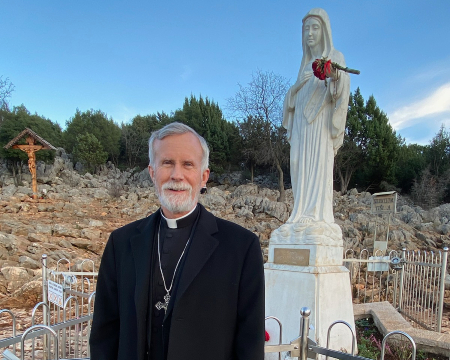 Hi readers, it seems you use Catholic Online a lot; that's great! It's a little awkward to ask, but we need your help. If you have already donated, we sincerely thank you. We're not salespeople, but we depend on donations averaging $14.76 and fewer than 1% of readers give. If you donate just $5.00, the price of your coffee, Catholic Online School could keep thriving. Thank you. Help Now >
Hi readers, it seems you use Catholic Online a lot; that's great! It's a little awkward to ask, but we need your help. If you have already donated, we sincerely thank you. We're not salespeople, but we depend on donations averaging $14.76 and fewer than 1% of readers give. If you donate just $5.00, the price of your coffee, Catholic Online School could keep thriving. Thank you. Help Now >
St. Jodoc
Facts
Author and Publisher - Catholic Online
Printable Catholic Saints PDFs
Shop St. Jodoc

St. Jodoc (Josse) Confessor December 13 A.D. 669 Those Britons who, flying from the swords of the English-Saxons, settled in Armorica in Gaul, upon the ruins of the Roman empire in those parts formed themselves into a little state on that coast till they were obliged to receive the laws of the French. Judicaël, commonly called Giguel. eldest son of Juthaël, became king of Brittany about the year 630. This prince soon after renounced this perishable crown to labor more securely for the acquisition of an incorruptible one, and retired into the monastery of St. Meen, in the diocese of St. Malo, where he lived in so great sanctity as to be honored after his death with the title of the Blessed Judicaël. When he resigned the crown be offered it to his younger brother Jodoc, called by the French Josse But Jodoc had the same inclinations with his elder brother However, to consult the divine will, he shut himself up for eight days in the monastery of Lammamiont, in which he had been brought up, and prayed night and day with many tears that God would direct him to undertake what was most agreeable to him, and most conducive to his divine honor and his own sanctification. He put an end to his deliberation by receiving the clerical tonsure at the hands of the bishop of Avranches, and joined a company of eleven pilgrims who purposed to go to Rome. They went first to Paris, and thence into Picardy in 636, where Jodoc was prevailed upon by Haymo, duke of Ponchieu, to fix upon an estate of his, which was at a sufficient distance from his own country, and secure from the honors which there waited for him Being promoted to priest's orders, he served the duke's chapel seven years, then retired with one only disciple named Vurmare, into a woody solitude at Ray, where he found a small spot of ground proper for tillage, watered by the river Authie. The duke built them a chapel and cells, in which the hermits lived, gaining by the tillage of this land their slender subsistence and an overplus for the poor. Their exercises were austere penance, prayer, and contemplation. After eight years thus spent here they removed to Runiac, now called Villers-saint-Josse, near the mouth of the river Canche, where they built a chapel of wood in honor of St. Martin. In this place they continued the same manner of life for thirteen years; when Jodoc having been bit by an adder, they again changed their quarters, the good duke who continued their constant protector, having built them a hermitage, with two chapels of wood, in honor of SS. Peter and Paul. The servants of God kept constant enclosure, except that out of devotion to the princes of the apostles, and to the holy martyrs, they made a penitential pilgrimage to Rome in 665. At their return to Runinc they found their hermitage enlarged and adorned, and a beautiful church of stone, which the good duke had erected in memory of St. Martin, and on which he settled a competent estate. The duke met them in person on the road, and conducted them to their habitation. Jodoc finished here his penitential course in 669, and was honoree by miracles both before and after his death. Winoc and Arnoc, two nephews of the saint, inherited his hermitage, which became a famous monastery, and was one of those which Charlemagne first bestowed on Alcuir in 792. It stands near the sea, in the diocese of Amiens, follows the order of St. Bennet, and the abbot enjoys the privileges of count. It is called St. Josse-sur-mer. St. Jodoc is mentioned on this day in the Roman Martyrology. See the life of this saint written in the eighth century; Cave thinks about the year 710. It is published with learned notes by Mabillon, Act Ben. t. 2, p. 566 Gall. Chr. Nov. t. 10, pp. 1289, 1290.
 Hi readers, it seems you use Catholic Online a lot; that's great! It's a little awkward to ask, but we need your help. If you have already donated, we sincerely thank you. We're not salespeople, but we depend on donations averaging $14.76 and fewer than 1% of readers give. If you donate just $5.00, the price of your coffee, Catholic Online School could keep thriving. Thank you. Help Now >
Hi readers, it seems you use Catholic Online a lot; that's great! It's a little awkward to ask, but we need your help. If you have already donated, we sincerely thank you. We're not salespeople, but we depend on donations averaging $14.76 and fewer than 1% of readers give. If you donate just $5.00, the price of your coffee, Catholic Online School could keep thriving. Thank you. Help Now >
More Saints
 New Saints canonized by Pope Francis
New Saints canonized by Pope FrancisFREE Saint Classes Printable Saint PDF's Light a Virtual Saint Candle







 Daily Readings for Saturday, April 20, 2024
Daily Readings for Saturday, April 20, 2024 St. Marian: Saint of the Day for Saturday, April 20, 2024
St. Marian: Saint of the Day for Saturday, April 20, 2024 Children's Prayer For Parents: Prayer of the Day for Saturday, April 20, 2024
Children's Prayer For Parents: Prayer of the Day for Saturday, April 20, 2024

